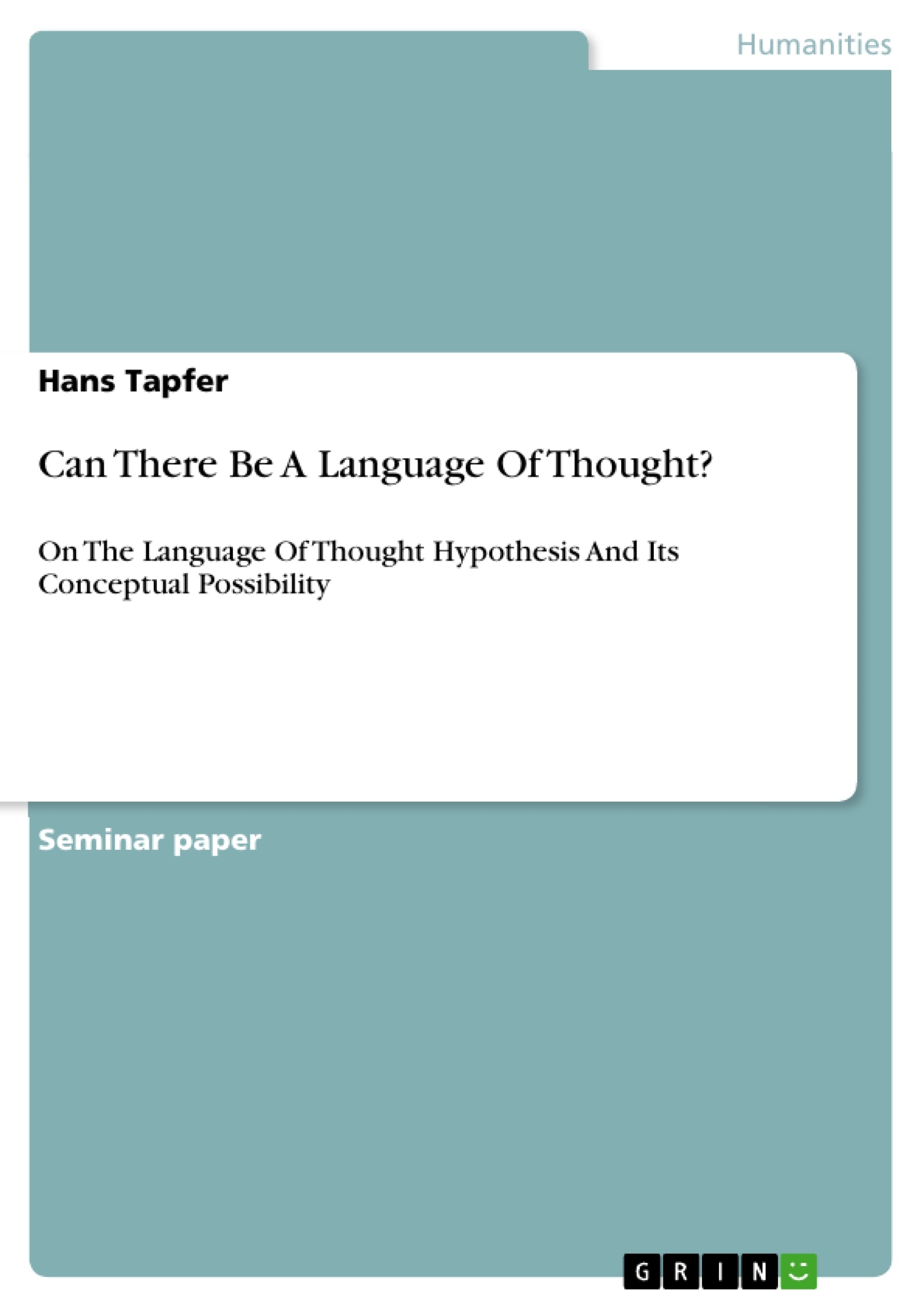This essay explains Fodors canonical argumentation in favour of the Language of Thought Hypothesis as well as the conceptual counter argument by Hacker. It becomes clear that even though Fodor makes a strong case for the value of the hypothesis, Hackers considerations provide a striking argument against it. However since these considerations presuppose an essential normativity of language, it results that despite the immense value of the Language of Thought hypothesis, whether it is tenable seems to hinge on whether one is able to provide a theory for the normativity of language. This is then viewed as the central problem in the debate that needs to undergo further scrutiny, since it is logically prior to any other criticism one might target the Language of Thought Hypothesis with. This essay was written in order to deliver insight into Fodors arguments and Hackers counter-arguments and to thereby show how one arrives at the aforementioned conclusion. For before one takes aim, ones target needs to be in clear view.
Table of Contents
- Introduction
- LOT and Fodors Presupposition
- The Language of Thought Hypothesis
- Fodors Presupposition
- The Technical Argument.
- The Metaphysical Argument
- Fodors Arguments
- The Methodological Argument.
- The Argument from Psychological Processes
- The Argument from Productivity and Systematicity
- Hackers Criticism of LOT
- The Argument from Linguistic Ability
- The Argument from Language as a Social Practice
- The Point of Discussion
- Conclusion
Objectives and Key Themes
This essay examines Fodor's arguments in favor of the Language of Thought Hypothesis (LOT) and Hacker's critical counterarguments. It explores the conceptual possibility of LOT, demonstrating the strength of Fodor's arguments while acknowledging Hacker's powerful critique. The essay analyzes the central issue in this debate, suggesting that the tenability of LOT depends on the ability to provide a theory for the normativity of language.
- The Language of Thought Hypothesis (LOT)
- Fodor's arguments for LOT
- Hacker's critique of LOT
- The normativity of language
- The conceptual possibility of LOT
Chapter Summaries
- Introduction: The essay introduces the concept of LOT and the connection between thought and language, highlighting Fodor's defense of LOT and Hacker's opposing view.
- LOT and Fodors Presupposition: This chapter explains the core principles of LOT, contrasting it with intentional realism. It also explores Fodor's presuppositions about the nature of thought and its relationship to language.
- Fodors Arguments: This chapter presents Fodor's arguments in favor of LOT, including arguments from causality, productivity, systematicity, and psychological processes. It provides insights into Fodor's reasoning and how he supports the hypothesis.
- Hackers Criticism of LOT: This chapter focuses on Hacker's critique of LOT, arguing that it is conceptually impossible. Hacker's arguments draw on the social nature of language and its requirement for third-person verification.
- The Point of Discussion: This chapter discusses the central point of debate between Fodor and Hacker, emphasizing the importance of a theory of language normativity in determining the viability of LOT.
Keywords
This essay focuses on key concepts such as the Language of Thought Hypothesis (LOT), intentional realism, propositional attitudes, language normativity, and the social nature of language. It also explores the arguments of prominent philosophers like Fodor and Hacker, examining their perspectives on the conceptual possibility of LOT.
Frequently Asked Questions
What is the Language of Thought Hypothesis (LOT)?
The LOT hypothesis suggests that thinking occurs in a mental language with a combinatorial syntax and semantics, similar to natural language.
Who are the main figures in the LOT debate discussed here?
The essay focuses on the defense of LOT by Jerry Fodor and the conceptual criticism provided by P.M.S. Hacker.
What is Fodor's "Argument from Productivity"?
Fodor argues that since humans can think an infinite number of thoughts with finite means, the mind must use a language-like system of representation.
What is Hacker's main objection to LOT?
Hacker argues that language is essentially a social practice with normative rules, which cannot exist as a private, internal mental "language."
What determines if LOT is tenable?
The essay concludes that the validity of LOT depends on whether one can provide a satisfactory theory for the normativity of language.
- Arbeit zitieren
- Hans Tapfer (Autor:in), 2018, Can There Be A Language Of Thought?, München, GRIN Verlag, https://www.grin.com/document/461334



